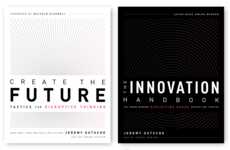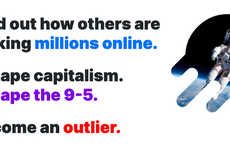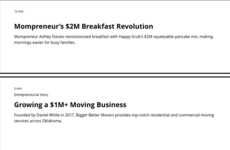
Senduran Bhakthakumaran — April 25, 2012 — Business
References: emeraldinsight & mortenhansen
Morten T. Hansen has taught the values of leadership, general management and corporate change in the MBA and executive education programs at Harvard Business School. His expertise in such diverse business aspects has lead to a successful career as a mentor and author. His ability to nurture innovation as a thought process and self-motivating factor is shown through Great by Choice.
3 Questions with Morten T. Hansen
1. How do you keep your work on the cutting edge?
Ask a fascinating question, then go from there. In 'Great by Choice,' Jim Collins and I were really curious about one thing; why do some thrive midst uncertainty and chaos, and others don't? That's a huge question for our time because we will never go back to a stable world.
2. How do you reset yourself to become creative (do you have any rituals?)
Find the time of day when you're thinking best, then protect that time from all kinds of things intruding on it. For me, it's the morning between 9am and noon. I don't do e-mails, answer the phone, look at Facebook, go to meetings, or do admin work. Protect the time at all costs. Measure how you do: how many hours per day did you ACTUALLY do creative work (I learned this from my co-author Jim Collins). I don't always succeed, but I try hard.
3. What is an example of a time where you have thrown away an existing idea to force yourself to find something new?
When we did the research for 'Great by Choice,' I was convinced that the most successful companies were the most innovative -- it just made so much sense. But then we started looking at the data, and it didn't turn out that way. We threw away the idea that innovation is a trump card and started to look at the data fresh again. Our subsequent finding about innovation -- that it is not about how much you innovate but HOW you innovate -- is new and flies in the face of conventional finding.
3 Questions with Morten T. Hansen
1. How do you keep your work on the cutting edge?
Ask a fascinating question, then go from there. In 'Great by Choice,' Jim Collins and I were really curious about one thing; why do some thrive midst uncertainty and chaos, and others don't? That's a huge question for our time because we will never go back to a stable world.
2. How do you reset yourself to become creative (do you have any rituals?)
Find the time of day when you're thinking best, then protect that time from all kinds of things intruding on it. For me, it's the morning between 9am and noon. I don't do e-mails, answer the phone, look at Facebook, go to meetings, or do admin work. Protect the time at all costs. Measure how you do: how many hours per day did you ACTUALLY do creative work (I learned this from my co-author Jim Collins). I don't always succeed, but I try hard.
3. What is an example of a time where you have thrown away an existing idea to force yourself to find something new?
When we did the research for 'Great by Choice,' I was convinced that the most successful companies were the most innovative -- it just made so much sense. But then we started looking at the data, and it didn't turn out that way. We threw away the idea that innovation is a trump card and started to look at the data fresh again. Our subsequent finding about innovation -- that it is not about how much you innovate but HOW you innovate -- is new and flies in the face of conventional finding.
Trend Themes
1. Thriving Amidst Uncertainty and Chaos - The current chaotic business environment presents an opportunity for businesses to learn how to thrive in such conditions.
2. Protecting Valuable Thinking Time - Protecting time solely for creative thinking can lead to innovative ideas and solutions.
3. How to Innovate - Innovation is not just about generating new ideas, but also about how to implement them effectively.
Industry Implications
1. Executive Education - Executive education programs can equip business leaders to thrive amidst the current uncertain business environment.
2. Time Management - Businesses can explore time management tools and techniques to protect valuable time for creative thinking.
3. Innovation Consulting - Businesses can leverage the concept of 'how to innovate' to develop unique and disruptive strategies with the help of innovation consulting firms.
2.2
Score
Popularity
Activity
Freshness























